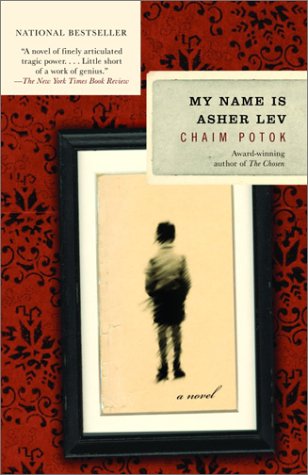About this item
Asher Lev is a Ladover Hasid who keeps kosher, prays three times a day and believes in the Ribbono Shel Olom, the Master of the Universe. Asher Lev is an artist who is compulsively driven to render the world he sees and feels even when it leads him to blasphemy.In this stirring and often visionary novel, Chaim Potok traces Asher's passage between these two identities, the one consecrated to God, the other subject only to the imagination.Asher Lev grows up in a cloistered Hasidic community in postwar Brooklyn, a world suffused by ritual and revolving around a charismatic Rebbe. But in time his gift threatens to estrange him from that world and the parents he adores. As it follows his struggle, My Name Is Asher Lev becomes a luminous portrait of the artist, by turns heartbreaking and exultant, a modern classic.
About the Author
Chaim Potok
Herman Harold Potok, or Chaim Tzvi, was born in Buffalo, New York, to Polish immigrants. He received an Orthodox Jewish education. After reading Evelyn Waugh's novel Brideshead Revisited as a teenager, he decided to become a writer. He started writing fiction at the age of 16. At age 17 he made his first submission to the magazine The Atlantic Monthly. Although it wasn't published, he received a note from the editor complimenting his work. In 1949, at the age of 20, his stories were published in the literary magazine of Yeshiva University, which he also helped edit. In 1950, Potok graduated summa cum laude with a BA in English Literature. After four years of study at the Jewish Theological Seminary of America he was ordained as a Conservative rabbi. He was appointed director of Leaders Training Fellowship, a youth organization affiliated with Conservative Judaism. After receiving a master's degree in English literature, Potok enlisted with the U.S. Army as a chaplain. He served in South Korea from 1955 to 1957. He described his time in S. Korea as a transformative experience. Brought up to believe that the Jewish people were central to history and God's plans, he experienced a region where there were almost no Jews and no anti-Semitism, yet whose religious believers prayed with the same fervor that he saw in Orthodox synagogues at home. Upon his return, he joined the faculty of the University of Judaism in Los Angeles and became the director of a Conservative Jewish summer camp affiliated with the Conservative movement, Camp Ramah. A year later he began his graduate studies at the University of Pennsylvania and was appointed scholar-in-residence at Temple Har Zion in Philadelphia. In 1963, he spent a year in Israel, where he wrote his doctoral dissertation on Solomon Maimon and began to write a novel.In 1964 Potok moved to Brooklyn. He became the managing editor of the magazine and joined the faculty of the Teachers' Institute of the Jewish Theological Seminary. The following year, he was appointed editor-in-chief of the Jewish Publication Society in Philadelphia and later, chairman of the publication committee. Potok received a doctorate in philosophy from the University of Pennsylvania.In 1970, Potok relocated to Jerusalem with his family. He returned to Philadelphia in 1977. After the publication of , he was diagnosed with brain cancer. He died at his home in Merion, Pennsylvania on July 23, 2002, aged 73.
Report incorrect product information.


